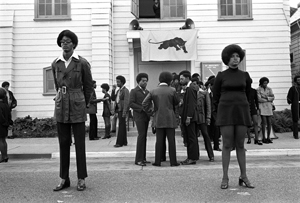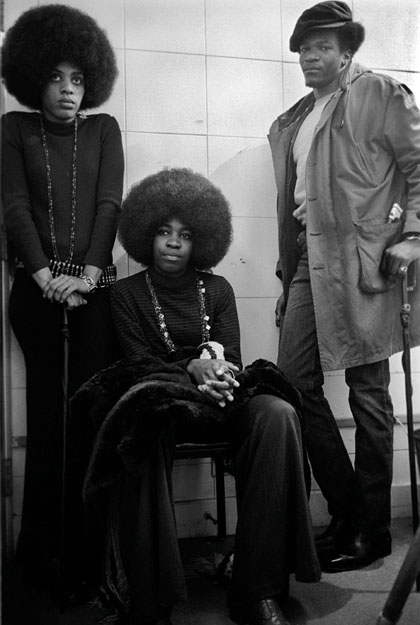The feminism movement has been around since the 1880s when the word “Feminism” appeared in the French language. The word found traction in Britain in the 1890s, and the United States in 1910, the name and movement has been narcotized by the media by utilizing its language, goals, political and social agenda. Feminism sought to influence popular culture by its very presence and by its persistent demands to be recognized as the official voice of all women.
Today African women, especially those on college campuses have accepted feminism as representation for all women. Feminist perspectives seem to be captivating African female writers who present African life through the favored feminist ideologies of African –male as a domineering brute and the African woman as lesbian.
The Color Purple and The Women of Brewster Place are two well known works that have received widespread recognition which either appeased the feminist rhetoric, or assured African feminist that their choice of agenda is righteous. The media too has played a significant role in convincing the African people in the west that feminism is born out of our culture.
The group of African feminists who operate outside of the culture, who go so far as to have sexual relationship with other women as a political ladder climbing, are lured into these choices because the rewards are seductive and tremendously profitable for those who are successful. These feminists receive varied publishing contracts, high public profiles such as talk shows and lecture circuit, tenured professorships, high speakers’ fees, influential power and most importantly, Anglo-Saxon approval, which all comes with the territory of promoting the mainly Anglo-Saxon feminist ideologies.
The most organized and committed of African feminists are the lesbians. From my experience and considering how homosexuality is still viewed on the surface amongst the village, African Lesbians have had little if no recognition in the community and virtually no influence as an organized group. Inside the over all feminist movement, they are validated and have organized and are flourishing. These women find themselves caught between a rock (the African village) and a hard place (the feminism movement) their loyalties are split, they’re sometimes unable to clearly focus on who their allegiance should be with, for what reasons and how best to deal with it.
The African feminists complain about the anti-African maltreatment that Anglo-Saxon feminist metes out, then in the next breath defend them against African critics both male and female. These who are the majority African lesbian feminists are willing to take leadership under Anglo-Saxon feminists and support the feminist agenda and as an offshoot or as a strategy, demand to lead non-lesbian/non-feminist African women and promote an agenda for African culture that furthers lesbian feminist ideology.
——————————————————
Since the 1960’s, efforts to coax African women full-fledged into the feminist movement and by extension into the burgeoning Lesbian movement, have, for the most part, failed. The presence of African female academics, politicians, entertainers who have helped promote feminist ideologies is evidentiary; however, the overwhelming majorities of African women, the regular folks, have rejected the feminist ideals and continue to do so
Due to the African cultural mindset our women for the most part stand adamantly against feminist ideology as an assault on the family and attack on their men. The African womanhood is anchored to the family, and her allegiance is tied to the African culture.
There is a “Black Feminist Movement” in the corporate U.S.A. that grew in response to, the Black Liberation Movement and the Feminist Movement, because African women felt they were being racially oppressed in the Women’s Movement and sexually oppressed in the Black Liberation Movement. Unfortunately the latter is as true as the former.
Throughout America Inc.’s sojourn from a period of genocide, stolen lands and stolen people, to become an incorporated entity, the term “black” was equated with African men and “woman” was equated with Anglo-Saxon women. Anglo-Saxon men was the last word on all that is and was, African women were invisible and all but ignored out of existence. The purpose of African feminism was to adequately address the way ethnicity, gender and class affected their lives and to take action to stop racist, sexist, and class discrimination.
As they become more involved and participated in the Black Liberation Movement and the Women’s Movement, they were often discriminated against sexually and racially oppressed. To be sure not African males or all Anglo-Saxon females in their respective movements were sexist and racist, African women still caught hell from the actions of enough of those with powerful influence.

African women faced constant sexism in the Black Liberation Movement such as the Civil Rights Movement, Black Nationalism, the Black Panthers, the Student Nonviolent Coordinating Committee, and others. African femininity was extremely sexualized in the Black liberation Movement which turned out to be more a liberation of the African males whose freedom was equated with manhood and the freedom of the African village with the redemption of male masculinity.
If you listen to the stories of the women from the 40’s, 50’s and 60’syou would realize that many men in the movement were interested in controlling our women’s sexuality. Feminist Bell hooks commented that during the Black Liberation Movement of the 1960s, “black men overemphasized Anglo-Saxon male sexual exploitation of the African woman in order to justify their disapproval of inter-racial relationships.” Yet they contradicted such statements and showed their true political views by indulging in inter-racial relationships themselves.
Some of the more famous “leaders” in the Black Liberation Movement often made sexist statements which were largely accepted without criticism.
And so this separation [of black men and women] is the cause of our need for self-consciousness, and eventual healing. But we must erase the separateness by providing ourselves with healthy African identities. By embracing a value system that knows of no separation but only of the divine complement the black woman is for her man. For
instance, we do not believe in the ‘equality’ of men and women. We cannot understand what the devils and the devilishly influenced mean when they say equality for women. We could never be equals… Nature has not provided thus.”
Amiri Baraka
He implies that men and women are unequal by nature. This is an attitude which he considers healthy and worthy of promotion. Not only are men and women different, he says, but women is mans complement, not man is womans complement. Thus there is an unequal relationship.
“I became a rapist. To refine my technique and modus operandi, I started out by practicing on black girls in the ghetto-in the black ghetto where vicious and dark deeds appear not as aberrations or deviations from the norm, but as part of the sufficiency of the Evil of a day-and when I considered myself smooth enough, I crossed the tracks and sought out white prey.”
Eldridge Cleaver
Not only is he, Cleaver, committing violence against women, but he considers the violence against African “girls”, babies, to be less serious than that against their white counterparts.
Elaine Brown recalls an organizational meeting of the Black Congress in which she and the other women were forced to wait to eat until the men were served food for which they had all contributed money. The “rules” were then explained to her and a friend: “Sisters… did not challenge Brothers. Sisters… stood behind their black men, supported their men, and respected them. In essence …it was not only ‘unsisterly’ of us to want to eat with our Brothers, it was a sacrilege for which blood could be shed.”
Let’s not forget the famous line “a womans place in the struggle is on her back”
Within the Civil Rights Movement, E. Frances White recalls, “I remember refusing to leave the discussion at a regional black student society meeting to go help out in the kitchen. The process of alienation from those militant and articulate men had begun for me.”
Not only the men were being sexist but a great number of the women in the Black Liberation Movements were enforcing strict gender roles on African women. In much the same way that women in dominant society do not resist but encourage sexism, African women fall prey to perpetuating patriarchy within the village.
If ever there were forces aligned to push African women into the waiting arms of Anglo-Saxon feminists and Lesbians it would be their frustration and exploitation by their own complements in the village.
Still the feminist movement has torn the African woman far a part from the village and has done more to alienate her from her complement in a more devastating way than any wayward African male could have done. The results of our seperations are some of the worst case of dysfunction imagined.


THANK YOU .
LikeLike
wow what a useful information man and I understood very much. thanks
LikeLike
Once again, a great piece.
LikeLike
Thank you sir!
LikeLike
Thanks for dropping by, please let me know which post and I will correct it.
LikeLike